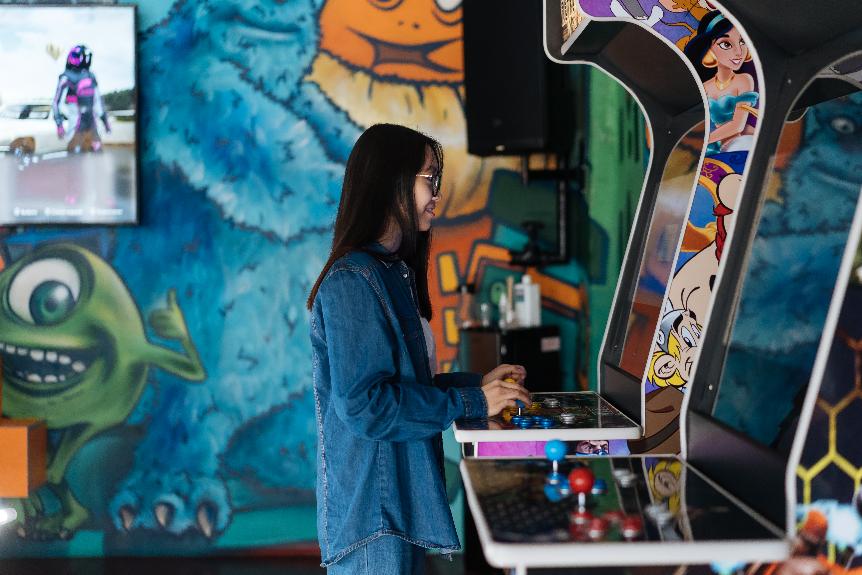No products in the cart.

Are you ready to step back in time and immerse yourself in the nostalgic world of 1980s arcade gaming?
Get ready to relive the excitement and thrill of iconic games like Pac-Man, Donkey Kong, and Space Invaders.
In this article, we'll explore the rise of arcade gaming, the retro aesthetics of arcade cabinets, and the unforgettable soundtracks that defined the era.
Join us as we unlock the enduring legacy of 1980s arcades and rediscover the joy of gaming past.
If you grew up in the 1980s, you likely remember the rise of arcade gaming as a cultural phenomenon. This era marked a turning point in the world of entertainment, as arcades sprung up in every corner of cities and towns, attracting hordes of eager gamers.
The cultural impact of arcade gaming was immense, shaping popular culture and influencing the way people interacted with technology. It brought people together, fostering a sense of community as players gathered around iconic games like Pac-Man and Space Invaders.
Moreover, arcade gaming drove technological advancements, pushing developers to create more powerful hardware and innovative game designs. The demand for better graphics, sound, and gameplay experiences led to the birth of new gaming technologies that continue to shape the industry today.
One of the most memorable aspects of the rise of arcade gaming in the 1980s was the plethora of iconic games that captivated players of all ages. Two of the top iconic 1980s arcade games were Pac-Man and Donkey Kong. Let's take a closer look at these legendary games:
| Game | Description |
|---|---|
| Pac-Man | Released in 1980, Pac-Man became an instant sensation. Players controlled a yellow, pizza-shaped character as it navigated a maze, gobbling up pellets while avoiding colorful ghosts. With its simple yet addictive gameplay, Pac-Man became a pop culture phenomenon and remains one of the most recognizable arcade games of all time. |
| Donkey Kong | First released in 1981, Donkey Kong introduced the world to Mario, the iconic plumber. Players took on the role of Mario as he tried to rescue his girlfriend from the clutches of the giant ape, Donkey Kong. This game featured innovative platforming mechanics and challenging levels, making it a huge hit and solidifying Mario's place in gaming history. |
These two games not only defined the 1980s arcade gaming experience but also laid the foundation for the future of the industry. Their enduring popularity and influence continue to be felt even today.
Step into the nostalgic world of 1980s arcade gaming and discover the unique retro aesthetics that defined the era's iconic arcade cabinets.
The nostalgic appeal of these cabinets is largely attributed to their visual design. With their bold and vibrant colors, flashy graphics, and eye-catching artwork, arcade cabinets from the 1980s captured the attention of gamers and passersby alike.
The cabinets often featured popular characters and themes from the games themselves, further adding to their nostalgic charm. The visual design of the cabinets was carefully crafted to draw players in and create an immersive gaming experience.
From the iconic side panel artwork to the illuminated marquees, every element of the retro arcade cabinets contributed to the overall aesthetic that's still beloved by gamers today.
Immerse yourself in the nostalgic world of 1980s arcade gaming through the captivating soundtrack that accompanied these iconic gaming experiences. The soundtracks of arcade games from the 80s had a profound impact on both the gaming industry and modern music.
Here are four ways in which arcade soundtracks influenced and continue to influence music today:
The impact of arcade soundtracks on modern music can't be understated. They continue to inspire and delight listeners, proving that the power of nostalgia can transcend time and technology.
Experience the lasting impact of 1980s arcades through their cultural influence and lasting legacy. The nostalgic appeal of these classic gaming centers continues to captivate generations of gamers, reminding them of a bygone era when arcades were the epicenter of social interaction and entertainment. The cultural impact of 1980s arcades cannot be overstated, as they not only revolutionized the gaming industry but also shaped popular culture in significant ways. From iconic games like Pac-Man and Space Invaders to the vibrant sounds and flashing lights that defined the arcade experience, these establishments left an indelible mark on society. To understand the enduring legacy of 1980s arcades, let's take a closer look at their cultural impact and the nostalgia they evoke.
| Cultural Impact | Nostalgic Appeal |
|---|---|
| Revolutionized the gaming industry | Recalls a bygone era of social interaction |
| Shaped popular culture | Reminds of iconic games and vibrant arcade atmosphere |
| Influenced the development of video game industry | Evokes memories of flashing lights and retro sounds |
| Introduced new genres and gameplay mechanics | Creates a sense of nostalgia for a simpler time |
The legacy of 1980s arcades lives on through the continued love and appreciation for these classic gaming establishments. The cultural impact they had, and the nostalgic appeal they evoke, ensure that the memories and experiences of the arcade era will never be forgotten.
The most popular arcade games in the 1980s had a significant impact on pop culture. They brought about technological advancements that revolutionized the gaming industry.
Back in the 1980s, it cost a quarter or more to play arcade games. Considering inflation, that would be about $1.00 or more today. The impact of inflation has significantly increased the cost of arcade gaming.
You can still find original arcade cabinets from the 1980s if you know where to look. Online marketplaces like eBay and local retro gaming stores are good places to start your search.
In the 1980s, arcade gaming faced controversies like ethical concerns and addiction issues. It's important to analyze these controversies to understand the impact they had on the gaming industry and society as a whole.
The rise of home gaming consoles in the 1980s had a significant impact on the popularity of arcade gaming. As consoles became more advanced, people started playing games at home instead of going to arcades. This led to the evolution of arcade gaming to stay relevant.
